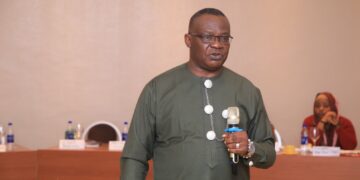The Association of Licensed Telecommunications Operators of Nigeria (ALTON), Chairman. Engr. Gbenga Adebayo has urged lawmakers to ensure clarity, coherence, and regulatory harmony in the proposed law to avoid institutional conflicts and safeguard investor confidence.
This was disclosed at the presentation to the Joint National Assembly Committee Hearing on the National Digital Economy and E-Governance Bill, 2025.
During his presentation on ALTON’s position, Engr. Adebayo, commended the Committees for the opportunity to contribute to the review process and praised the Bill’s vision to modernise Nigeria’s digital ecosystem, promote e-governance, and provide a legal foundation for emerging technologies such as Artificial Intelligence (AI).
According to him, “The Bill vests broad powers in the National Information Technology Development Agency (NITDA) that intersect with the statutory mandate of the Nigerian Communications Commission (NCC)”
He, however, recommended a clear delineation of responsibilities, with NITDA to lead on digital policy, e-governance, and standard setting, while NCC retains regulatory oversight on telecommunications networks, infrastructure, and digital services.
While speaking on Artificial Intelligence, the ALTON boss advised that the regulatory approach should reflect international best practice by distinguishing between policy guidance to be led by NITDA, and technical regulation to remain under NCC.
Adebayo cited global models such as those in the UK, India, and the EU, noting that this dual structure ensures accountability while encouraging innovation.
He further called for caution in the certification and liability framework for trust service providers while warning that it must not impose additional compliance burdens on licensed telecom operators already regulated by the NCC.
Meanwhile, he suggested that such provisions apply mainly to public-sector digital platforms, not private network operators.
Commenting on addressing ministerial powers, he proposed that Section 82 of the Bill be reviewed. “To safeguard institutional independence and align with global standards that separate ministerial policy direction from operational regulation, as this will promote investor confidence and regulatory certainty,” he said.
To strengthen inter-agency coordination, ALTON recommended embedding “a National Digital Cooperation and Interoperability Framework” in the Bill to enable effective collaboration between NITDA, NCC, NDPC, and ONSA, and to prevent policy fragmentation.
Similarly, he reaffirmed ALTON’s support for the Bill, emphasising that it should complement, not override, existing sectoral laws and that institutional roles must be clearly defined to avoid jurisdictional overlaps.
“ALTON reiterates its full support for the digital transformation of Nigeria but calls for clear jurisdictional boundaries, institutional independence, and structured collaboration to ensure the Bill’s objectives are achieved efficiently and sustainably,” he averred.
Consequently, he formally submitted ALTON’s position paper to the Joint Committees, thanking the lawmakers for the opportunity to contribute to what he described as an essential national process, Adebayo concluded.





